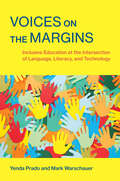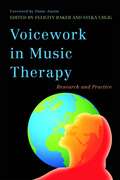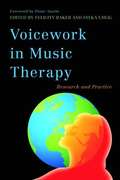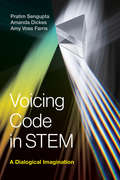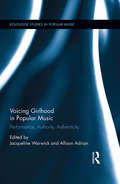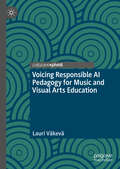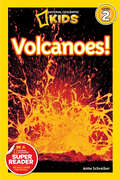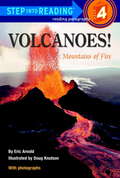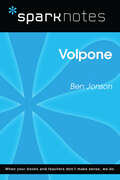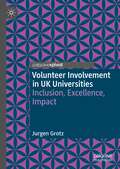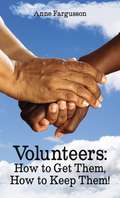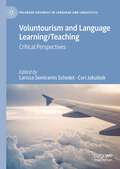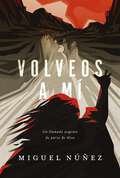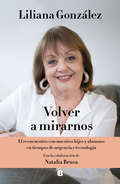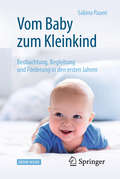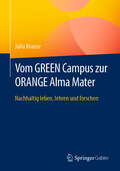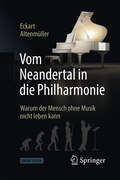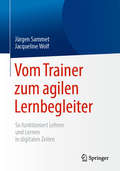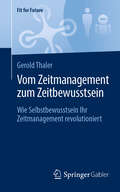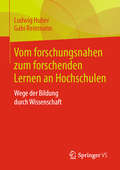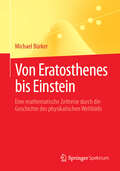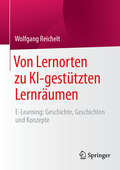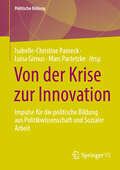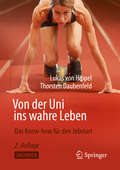- Table View
- List View
Voices on the Margins: Inclusive Education at the Intersection of Language, Literacy, and Technology
by Mark Warschauer Yenda PradoA rich view of inclusive education at the intersection of language, literacy, and technology—drawing on case study research in a diverse full-inclusion US school before, during, and after the COVID-19 pandemic.Despite advancing efforts at integration, the segregation of students with disabilities from their nondisabled peers persists. In the United States, 34 percent of all students with disabilities spend at least 20 percent of their instructional time in segregated classrooms. For students with intellectual or multiple disabilities, segregated placement soars to 80 percent. In Voices on the Margins, Yenda Prado and Mark Warschauer provide an ethnography of an extraordinary full-inclusion public charter school in the western United States—Future Visions Academy. And they ask: What does it mean to be inclusive in today&’s schools with their increasingly pervasive use of digital technologies?Voices on the Margins examines the ways digital technologies support inclusion and language and literacy practices for culturally and linguistically diverse children with and without disabilities. A wide range of qualitative data collected in the case study illuminates three central themes: (1) the kinds of social organization that allow a fully inclusive environment for children with disabilities to thrive, (2) the ways that digital technologies can be used to help students express their voice and agency, while developing language and literacy skills, and (3) the ways that digital technologies can be used to foster stronger networks and connections between students, teachers, staff, and parents.
Voicework in Music Therapy
by Sylka Uhlig Edited by Felicity BakerThe voice is a powerful instrument in music therapy practice and this anthology of voicework techniques explores everything the practitioner and researcher needs to know in order to bring about successful vocal interventions across a broad range of client groups. Compiling a wealth of international evidence-based practice, this book offers detailed descriptions of clinical methods that are grounded in research. Chapters are grouped into structured and unstructured approaches for use with clients of all ages. Clinical populations covered include neonates, children with autism or developmental disability, individuals with neurological damage including stroke, Parkinson's disease patients, traumatic brain injury, and spinal injury, people with mental illness, medical conditions such as asthma and pain, oncology and palliative care, aged care and dementia. This book will be an invaluable resource for any music therapy student, practitioner or researcher looking to explore the use of voicework in music therapy.
Voicework in Music Therapy: Research and Practice
by Diane Austin Felicity Baker Sylka UhligThe authors bring together 16 chapters by a group of music therapy voicework specialists from North America, Europe, Asia, and Australia who describe to music therapy students, practitioners, and researchers voicework techniques for clients of all ages. They explain structured and free approaches to voicework with autistic and at-risk children; adults who were told as children they could not sing; newborns; individuals with emotional trauma, dementia, spinal cord injury, traumatic brain injury, neurological damage, Parkinson's disease, and aphasia or apraxia; and those in hospice or palliative care. Annotation ©2012 Book News, Inc. , Portland, OR (booknews. com)
Voicing Code in STEM: A Dialogical Imagination
by Pratim Sengupta Amanda Dickes Amy Voss FarrisAn exploration of coding that investigates the interplay between computational abstractions and the fundamentally interpretive nature of human experience.The importance of coding in K-12 classrooms has been taken up by both scholars and educators. Voicing Code in STEM offers a new way to think about coding in the classroom--one that goes beyond device-level engagement to consider the interplay between computational abstractions and the fundamentally interpretive nature of human experience. Building on Mikhail Bakhtin's notions of heterogeneity and heteroglossia, the authors explain how STEM coding can be understood as voicing computational utterances, rather than a technocentric framing of building computational artifacts. Empirical chapters illustrate this theoretical stance by investigating different framings of coding as voicing.
Voicing Girlhood in Popular Music: Performance, Authority, Authenticity (Routledge Studies in Popular Music)
by Jacqueline Warwick Allison AdrianThis interdisciplinary volume explores the girl’s voice and the construction of girlhood in contemporary popular music, visiting girls as musicians, activists, and performers through topics that range from female vocal development during adolescence to girls’ online media culture. While girls’ voices are more prominent than ever in popular music culture, the specific sonic character of the young female voice is routinely denied authority. Decades old clichés of girls as frivolous, silly, and deserving of contempt prevail in mainstream popular image and sound. Nevertheless, girls find ways to raise their voices and make themselves heard. This volume explores the contemporary girl’s voice to illuminate the way ideals of girlhood are historically specific, and the way adults frame and construct girlhood to both valorize and vilify girls and women. Interrogating popular music, childhood, and gender, it analyzes the history of the all-girl band from the Runaways to the present; the changing anatomy of a girl’s voice throughout adolescence; girl’s participatory culture via youtube and rock camps, and representations of the girl’s voice in other media like audiobooks, film, and television. Essays consider girl performers like Jackie Evancho and Lorde, and all-girl bands like Sleater Kinney, The Slits and Warpaint, as well as performative 'girlishness' in the voices of female vocalists like Joni Mitchell, Beyoncé, Miley Cyrus, Taylor Swift, Kathleen Hanna, and Rebecca Black. Participating in girl studies within and beyond the field of music, this book unites scholarly perspectives from disciplines such as musicology, ethnomusicology, comparative literature, women’s and gender studies, media studies, and education to investigate the importance of girls’ voices in popular music, and to help unravel the complexities bound up in music and girlhood in the contemporary contexts of North America and the United Kingdom.
Voicing Responsible AI Pedagogy for Music and Visual Arts Education
by Lauri VäkeväThis book critically examines the integration of generative artificial intelligence (Gen AI) in music education, exploring its transformative potential and associated risks. It underscores the necessity for innovative AI pedagogies across music and the arts, offering educators, researchers, and policymakers valuable insights for incorporating Gen AI into teaching while mitigating its hazards. By adopting a balanced critical perspective, the book aims to promote a dynamic, inclusive, and responsible educational approach that is responsive to the rapid advancements in adaptive technology. The book's argumentation is grounded in synthesizing Deweyan pragmatist and Baradian posthumanist philosophical perspectives. These perspectives collectively provide a framework for addressing the deployment of Gen AI in music education within a broader ethical context of global sustainability. The book is also informed by the author's many years as a scholar of music education.
Volcanoes (National Geographic Kids Readers)
by Anne SchreiberThe cool story of volcanoes will intrigue kids and adults alike. Hot melted rock from the middle of our planet forces its way up through cracks in the Earth&’s crusts, exploding violently and sometimes unexpectedly in volcanic fury that can terrorize populations for months, even years. Anne Schreiber&’s narrative gives readers a little of the science, a little of the history, and a lot of the action. National Geographic photography fires the imagination on dramatic spreads alive with vivid images of lava, ash, molten rock, weird rocks, and steaming seawater.
Volcanoes!: Mountains of Fire (Step into Reading)
by Eric ArnoldA volcano could be called a sleeping mountain--that is, until it wakes up! What is it like to witness the eruption of one of nature's majestic time bombs? Young readers can learn what makes volcanoes "tick," and read about some of the most famous eruptions in history.
Volpone (SparkNotes Literature Guide Series)
by SparkNotesVolpone (SparkNotes Literature Guide) by Ben Jonson Making the reading experience fun! Created by Harvard students for students everywhere, SparkNotes is a new breed of study guide: smarter, better, faster. Geared to what today's students need to know, SparkNotes provides: *Chapter-by-chapter analysis *Explanations of key themes, motifs, and symbols *A review quiz and essay topicsLively and accessible, these guides are perfect for late-night studying and writing papers
Volunteer Involvement in UK Universities: Inclusion, Excellence, Impact (Rethinking University-Community Policy Connections)
by Jurgen GrotzProviding a comprehensive overview of volunteer involvement in UK universities, this book addresses a distinct and substantive policy and management issue. Offering examples of volunteer involvement with students, staff, alumni and communities from 147 UK Higher Education Institutions, it provides important background to understanding volunteer involvement. It also introduces key concepts for critically assessing ways in which those who seek to involve volunteers can respond to rapidly changing environments. Drawing on a combination of theoretical perspectives and practical experiences the book systematically explores approaches based on the current structures of volunteer involvement in UK universities, which provides accessible insights for Higher Education Institutions into how they can effectively organise volunteer involvement and maximise its societal impact. Developing 10 indicators with measures to evidence universities’ strategic approaches and achievements in community-university relations, the book offers practical ways to plan, enable, monitor, and assess the impact of volunteer involvement in universities.
Volunteers: How to Get Them, How to Keep Them!
by Anne FargussonI have written this book out of my experience working in small to medium sized churches. I address the great challenges of finding, training, and keeping volunteers. There are some simple techniques that I learned to have happy and engaged volunteers who do not get burned out.I also spend time describing how you can run a successful children&’s ministry with a minimum of people and yet not overburdening any of them. I talk about ways to combine functions so that you still cover all the age levels but in an efficient and effective manner.
Voluntourism and Language Learning/Teaching: Critical Perspectives (Palgrave Advances in Language and Linguistics)
by Larissa Semiramis Schedel Cori JakubiakThis edited volume extends current voluntourism theorizing by critically examining the intersections among various forms of work-leisure travel and language learning/teaching. The book’s contributors investigate volunteer tourism and its cognates such as working holidaymaking, international internships, and gap year labor, as discursive fields in which powerful ideas about language(s), their speakers, and pedagogical practices are propagated worldwide. The various authors’ chapters shed light on the hegemony of global English, the social consequences of linguistic commodification and neoliberal rationalities, the ways in which speaker identity positions can alter the exchange value of languages, and how language competencies are tied to power in the labor market, among related topics. This volume will be of interest to readers in Applied Linguistics, Critical Sociolinguistics, Educational and Linguistic Anthropology, Tourism and Leisure Studies, Migration and Mobility Studies, and Language Teaching and Learning.
Volveos a mí: Un llamado urgente de parte de Dios
by Miguel NúñezEn Volveos a mí, el Dr. Miguel Núñez presenta de qué manera a lo largo de la historia redentora el pueblo de Dios se ha rebelado contra el mismo Dios que le ha traído la libertad, y cómo Dios, en medio de la infidelidad de Su pueblo, ha permanecido fiel y ha hecho todos los esfuerzos posibles para llamar a Su pueblo de regreso a Su presencia. Desde que Dios formó la nación de Israel miles de años atrás, la tendencia del pueblo de Dios ha sido alejarse de manera recurrente de su Creador y Redentor para volverse a sus malos caminos. Por otro lado, ha sido siempre el deseo de Dios de llamar a Su pueblo de regreso a Él, reconociendo que, alejados de Él, cosecharán grandes y destructivas consecuencias; y solamente en la cercanía con Él pueden experimentar Sus bendiciones. Cada uno de los capítulos de este libro considera diferentes momentos de la historia redentora donde el pueblo de Dios se había alejado y donde Dios le llamó de regreso a Su presencia.&“Volveos a mí&” es una frase que aparece en Zacarías 1:3 donde Dios dice lo siguiente: &“Diles, pues: &‘Así dice el Señor de los ejércitos: &“Volveos a mí&” —declara el Señor de los ejércitos— y yo me volveré a vosotros&” —dice el Señor de los ejércitos. . .&” En este versículo se ve el corazón de un Dios que desea tener comunión con Su pueblo para poderle instruir, dirigir, proteger y bendecir. Return to MeIn Return to Me, Dr. Miguel Núñez presents how throughout redemptive history God's people have rebelled against the very God who has brought them freedom, and how God, in the midst of His people's unfaithfulness, has remained faithful and made every effort to call His people back to His presence. Since God formed the nation of Israel thousands of years ago, the tendency of God's people has been to repeatedly turn away from their Creator and Redeemer and turn back to their wicked ways. On the other hand, it has always been God's desire to call His people back to Him, recognizing that, separated from Him, they will reap great and destructive consequences; and only in closeness to Him can they experience His blessings. Each of the chapters of this book considers different moments in redemptive history where God's people had fallen away and where God called them back into His presence.&“Return to me&” is a phrase that appears in Zechariah 1:3 where God says the following: &“Therefore say to them, 'Thus says the LORD of hosts, &“Return to Me,&” declares the LORD of hosts, &“and I will return to you,&” says the LORD of hosts . . .&” In this verse we see the heart of a God who desires to commune with His people so that He can instruct, direct, protect, and bless them.
Volver a mirarnos: El reencuentro con nuestros hijos y alumnos en tiempos de urgencia y tecnología
by Liliana GonzálezUn libro que nos ayuda a mirar a los niños y los adolescentes de hoy. Volver a mirarnos es una invitación a reencontrarnos en medio de las urgencias, el avance tecnológico, la rutina. El mundo es cada vez más complejo, pero también cada vez más maravilloso. ¿Qué mirada y qué voz podemos utilizar para conectarnos con nuestros hijos-alumnos? Liliana González, en su incansable lucha por la saldar la deuda que tenemos los adultos con la infancia, nos invita a ampliar la mirada para alojar nuevas preguntas: ¿Qué lugar ocupan las pantallas en la vida de nuestros hijos? ¿Cuáles son los síntomas del bullying? ¿Les enseña la escuela a leer críticamente lo que se les vende? ¿Jerarquiza los espacios donde puedan expresarse libremente? ¿Cómo transmitirles, en tiempos del chat, la importancia del encuentro real con sus amigos? En esta oportunidad lo hace con el aporte de su hija, Natalia Brusa, quien desde la comunicación social suma elementos para tratar de acercarnos sin prejuicios al mundo de los niños y los adolescentes de hoy. Este libro nos ayuda a sumar humanidad a la observación amorosa de la infancia, de manera pacífica e inclusiva. Para mejorar la calidad de vida de todos y todas. https://www.youtube.com/watch?v=NrElYgJzwqY
Vom Baby zum Kleinkind: Beobachtung, Begleitung und Förderung in den ersten Jahren
by Sabina PauenMit diesem reich bebilderter Beobachtungsleitfaden k#65533;nnen Sie Kinder vom ersten Tag an kompetent begleiten. Lernen Sie mehr #65533;ber die faszinierenden Ver#65533;nderungen, die gerade zu Beginn des Lebens fast t#65533;glich stattfinden, und halten Sie fest, wann wichtige Meilensteine der Entwicklung im konkreten Fall erreicht werden. Kurze, leicht verst#65533;ndliche Texte und anschaulichen Illustrationen helfen dabei, den eigenen Blick f#65533;r Fortschritte zu schulen. In dieser Neuauflage finden Sie nun auch Altersangaben zur Orientierung, wann einzelne Meilensteine typischerweise erreicht werden. So k#65533;nnen Sie pr#65533;fen, ob die Entwicklung des beobachteten Kindes ,,normal" verl#65533;uft. Das Buch hilft Ihnen durch modernes Fachwissen und praktische Tipps zur Fr#65533;hf#65533;rderung, die Entwicklung des Kindes besser zu verstehen und unterst#65533;tzend zu begleiten.
Vom GREEN Campus zur ORANGE Alma Mater: Nachhaltig leben, lehren und forschen
by Julia KrauseNachhaltigkeit an Hochschulen braucht einen neuen Ansatz – umfassend, vernetzt und strategisch. Hochschulen tragen die Verantwortung, Nachhaltigkeit in Lehre, Forschung und Campusleben ganzheitlich zu verankern und als Vorbild für Gesellschaft und Zukunft zu wirken. Dieses Buch zeigt, wie Hochschulen Nachhaltigkeit als festen Bestandteil ihrer Identität etablieren und alle relevanten Bereiche sowie interne und externe Akteure einbeziehen können. Mit dem ORANGE-Konzept (Orientation, Research, Alliance, Networks, Governance, Education) präsentiert die Autorin eine praxisnahe Roadmap, um Nachhaltigkeit systematisch und Inspirierend umzusetzen. Das Modell macht die wichtigsten Handlungsfelder sichtbar, fördert den Austausch und motiviert dazu, innovative Wege zu gehen – einfach, verständlich und für alle Stakeholder zugänglich. Das Buch richtet sich an Hochschulleitungen, Nachhaltigkeitsbeauftragte, Forschende und alle, die Hochschulen als Motor nachhaltiger Transformation begreifen. Es lädt dazu ein, Nachhaltigkeit kreativ und intuitiv zu gestalten und die Zukunft der Hochschullandschaft aktiv mitzuprägen. Der Inhalt Grundlagen der Nachhaltigkeit und Status Quo der Bewegung an Hochschulen Das ORANGE-Konzept Die ORANGE Alma Mater – ein Ort des Wandels Die Hochschule von morgen – Vision einer nachhaltigen Zukunftshochschule
Vom Neandertal in die Philharmonie: Warum der Mensch ohne Musik nicht leben kann
by Eckart AltenmüllerWarum haben wir Menschen Musik? Wie entfaltet Musik ihre Wirkung? Was geht dabei in unserem Gehirn vor? Fördert Musik die Intelligenz? Dient sie dem Gruppenzusammenhalt? Teilt Musik Emotionen mit? Dieses Buch erklärt die zahlreichen Wirkungen von Musik auf Fühlen und Denken, auf die Organisation von Gruppen sowie auf unsere körperliche und geistige Gesundheit. Im ersten Teil des Werkes werden die evolutionären Grundlagen der Musikwahrnehmung und des Musizierens dargestellt. Die faszinierenden neuen Erkenntnisse zu den positiven, aber auch den negativen Auswirkungen intensiven Musizierens auf das Nervensystem werden in den folgenden Kapiteln geschildert. Glücklicherweise macht Musik nur selten krank – viel wichtiger sind die bislang noch gar nicht ausgeschöpften heilenden Potenziale und die große Macht der positiven Emotionen, die durch Musik ausgelöst werden. Mit diesen erfreulichen und zukunftsweisenden Aspekten schließt das Buch, das jeden ansprechen wird, der eine Liebe zur Musik empfindet, sei es als Musizierender oder als Hörer.
Vom Trainer zum agilen Lernbegleiter: So funktioniert Lehren und Lernen in digitalen Zeiten
by Jacqueline Wolf Jürgen SammetReine Präsenztrainings werden immer mehr ergänzt oder gar abgelöst durch moderne Lernformen wie Blended Learning, Online-Trainings, E-Learning und informellem Lernen. Was bedeutet dies für Sie als Trainer (Dozent, Referent, Personalentwickler)?Dieses Fachbuch zeigt auf, wie sich das Berufsbild des Trainers durch die Digitalisierung ändert und welche Kompetenzen Sie als Trainer benötigen, um in der „Learning Revolution“ erfolgreich zu sein. Denn: Fachwissen gepaart mit Präsenzdidaktik reichen hier nicht mehr aus.Dieses Werk nimmt Sie an der Hand, um als Trainer selbst wieder Lerner zu werden und sich zum „agilen Lernbegleiter“ weiterzuentwickeln. Es gibt Ihnen eine Orientierung im digitalen „Trainerkompetenz-Dschungel“. Praxistauglich und klar verständlich erhalten Sie sowohl theoretisches Hintergrundwissen als auch praktische Umsetzungsmöglichkeiten für die Modernisierung Ihres Weiterbildungsangebots.
Vom Wesen der deutschen Universität (René König Schriften. Ausgabe letzter Hand #2)
by René KönigRené Königs Buch "Vom Wesen der deutschen Universität" schildert beredt die hochschulpolitischen Anschauungen klassischer deutscher Denker. Fichte und Schelling, Schleiermacher und Humboldt werden daraufhin befragt, inwieweit ihre Überlegungen über den aktuellen Anlass hinaus Geltung für spätere Epochen beanspruchen dürfen.
Vom Zeitmanagement zum Zeitbewusstsein: Wie Selbstbewusstsein Ihr Zeitmanagement revolutioniert (Fit for Future)
by Gerold ThalerDieses Buch richtet sich an junge Erwachsene und Berufseinsteiger, die Orientierung suchen, an ihrem Selbstbewusstsein zweifeln oder sich von der Geschwindigkeit des Lebens überfordert fühlen. Es zeigt, wie Sie Selbstvertrauen systematisch aufbauen und dadurch ein zeitbewusstes Leben führen können – ohne darauf zu warten, dass ein Schicksalsschlag oder eine Krise Sie dazu zwingt. Selbstbewusstsein ist die Grundlage für selbstbestimmte Entscheidungen und die Fähigkeit, mit Stress und der Schnelllebigkeit der modernen Arbeitswelt umzugehen. Dieses Buch beleuchtet, warum Zeit unsere wertvollste Ressource ist und wie wir lernen können, Herausforderungen des Alltags besser zu meistern. Es gibt praktische Einblicke in Themen wie Resilienz und den Umgang mit Zukunftsängsten. Die zentrale Botschaft verdeutlicht: Selbstbewusstsein ist die Basis unserer persönlichen Produktivität und lässt sich steigern! Mit persönlichen Geschichten und wissenschaftlichen Erkenntnissen inspiriert dieses Buch zu einem Leben, in dem Sie nicht nur Zeit managen, sondern bewusst gestalten. Denn: Es lässt sich leichter leben, wenn Sie zeitbewusst leben. Starten Sie jetzt Ihre Reise zu einem zeitbewussten Leben!
Vom forschungsnahen zum forschenden Lernen an Hochschulen: Wege der Bildung durch Wissenschaft
by Gabi Reinmann Ludwig HuberDas Buch liefert eine durchgängige und kohärente Orientierung zu forschungsnahem und forschendem Lernen. Es unternimmt den Versuch, die zahlreich vorhandenen Modelle, typische Erfahrungen und praktische Empfehlungen zu bündeln und aufeinander zu beziehen. Als Monografie zweier hochschuldidaktisch tätiger Wissenschaftler bietet das Buch eine komplementäre Lektüre zu den zahlreichen Artikeln in Sammelbänden und Zeitschriften über die Verbindung von Forschung und Lehre.
Von Eratosthenes bis Einstein: Eine mathematische Zeitreise durch die Geschichte des physikalischen Weltbilds
by Michael BürkerDer Buchtitel Von Eratosthenes bis Einstein deutet einen großen Bogen an, der in einer mathematischen Zeitreise durchlaufen wird. Das Buch wendet sich an Studierende und an Personen, welche mehr über die Geschichte unseres Weltbilds von der Antike bis zur Gegenwart im Zusammenhang mit den Biografien der Protagonisten erfahren wollen. In der Antike sind dies Denker, welche nach rationalen Ursachen der Naturerscheinungen fragen und rationale Antworten versuchen, und Denker, welche Philosophie, Mathematik und Astronomie zu einer ersten Blüte bringen. In der Renaissance und Neuzeit weisen Kopernikus mit dem heliozentrischen Weltbild sowie Galilei und Kepler mit einer neuen Verknüpfung von Empirie und mathematisch geprägter Theorie den Weg zu naturwissenschaftlichem Denken, vollendet Isaac Newton mit einer tieferen Begründung und Mathematisierung der Physik die kopernikanische Wende und eröffnet gleichzeitig eine Forschungs- und Wissensvielfalt ohnegleichen. Schließlich legen Planck mit der Quantentheorie und Einstein mit den beiden Relativitätstheorien die Grundlagen unseres heutigen Weltbilds, in dem die Urknalltheorie den Beginn unserer Raumzeit vor etwa 14 Milliarden Jahren anzeigt, aber auch die Frage aufkommt, ob hinter der Entwicklung des Universums, wie wir es heute verstehen, eine zielgerichtete Strategie hin zur Existenz des Menschen steckt oder ob diese Entwicklung ein bloßer Zufall äußerst geringer Wahrscheinlichkeit ist.
Von Lernorten zu KI-gestützten Lernräumen: E-Learning: Geschichte, Geschichten und Konzepte
by Wolfgang ReicheltDie Digitalisierung von Bildungsprozessen ist eine der wichtigsten gesellschaftlichen Aufgaben des 21. Jahrhunderts. Spätestens die Corona-Pandemie hat das nicht nur den Unternehmen, sondern auch den Schulen, Berufsschulen und allen weiteren Bildungsträgern teilweise ziemlich schmerzhaft vor Augen geführt. Doch worauf kommt es eigentlich an, wenn man Bildungsprozesse digitalisieren möchte? Wolfgang Reichelt zeigt in seinem mit amüsanten Anekdoten gespickten autobiographischen Rückblick auf 40 Jahre E-Learning: Nach wie vor kommt es auf die Basics an!
Von der Krise zur Innovation: Impulse für die politische Bildung aus Politikwissenschaft und Sozialer Arbeit (Politische Bildung)
by Marc Partetzke Isabelle-Christine Panreck Luisa GirnusDas Buch bietet einen breiten Überblick aktueller Forschung über Krisen und Innovationen der Gegenwart und ihre Konsequenzen für die politische Bildung. Mit interdisziplinärem Anspruch analysieren Forschende u. a. aus Politikwissenschaft und Sozialer Arbeit gesellschaftliche Herausforderungen ebenso wie neue Lösungsansätze innerhalb formaler und non-formaler Bildungsangebote und ihrer sozialen Kontexte. Im Mittelpunkt stehen hierbei Fragen der Partizipation und Teilhabe, der Verbindung schulischer und außerschulischer Bildungsorte und der Politikdidaktik. Der Band richtet sich an Forschende, Studierende sowie Praktiker*innen der politischen Bildung.
Von der Uni ins wahre Leben: Das Know-how für den Jobstart
by Thorsten Daubenfeld Lukas von HippelAbsolventen möchten möglichst schnell Erfolge verzeichnen, Unternehmen möglichst schnell erfolgreiche Mitarbeiter. Im Fächerkanon einer Hochschulausbildung fehlen jedoch oft die Teilgebiete, die für die Karriere wichtig sind, wie zum Beispiel entscheidende Soft Skills oder notwendige Kenntnisse im Bereich Wirtschaft und Finanzen. Lukas von Hippel und Thorsten Daubenfeld berichten aus eigener Erfahrung und geben eine komprimierte Einführung in allgemein berufsrelevante Kompetenzen. Dass viele dieser Kenntnisse auch das Privatleben erfolgreicher machen können, ist ein erfreulicher Nebeneffekt. Das Buch enthält zahlreiche anschauliche Beispiele und wendet sich an Absolventen sowie an Berufseinsteiger.
